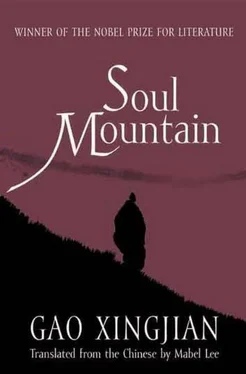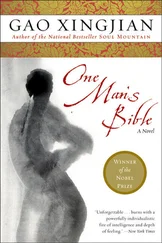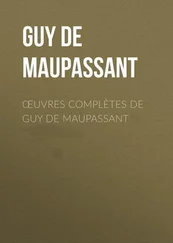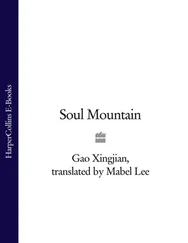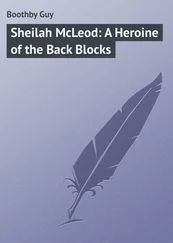The sides of the nostrils, the corners of the mouth, the upper and lower lips, the cheekbones, the forehead and the middle of the forehead indicate that the carver had a sound knowledge of the human head. Looking at it closely again, it is only the eye sockets and pointed forehead that are exaggerated, the thrust of the carving of the flesh gives it a sort of tenseness. Without the tiger whiskers, it is a replica of the face of primitive man with markings on it. Their understanding of nature and the self is fully encompassed in the round black holes of the eye sockets. The two holes at the corners of the mouth reveal nature’s scorn for man and show man’s fear of nature. The face also accurately expresses the animal nature in human beings and the fear of this animal nature within themselves.
Man cannot cast off this mask, it is a projection of his own flesh and spirit. He can no longer remove from his own face this mask which has already grown like skin and flesh so he is always startled as if disbelieving this is himself, but this is in fact himself. He cannot remove this mask, and this is agony. But having manifested itself as his mask, it cannot be obliterated, because the mask is a replica of himself. It has no will of its own, or one could say it has a will but no means of expression and so prefers not to have a will. Therefore it has left man with an eternal face with which he can examine himself in amazement.
This is indeed a masterpiece. I found it amongst the holdings of a museum in Guiyang, at the time it was closed for renovations. Through the help of friends, I got letters of introduction, then had an acquaintance phone on some pretext which eventually moved the deputy director of the museum. He is a good-natured cadre, quite fat, and always holding a mug of tea in his hand. I think he is already quite advanced in years and probably near retirement. He got someone to open two big storerooms for me so that I could go through the shelves piled with bronze weapons and assorted earthenware pots. This was of course magnanimous treatment but I didn’t discover anything memorable. So taking advantage of his good nature, I made a second visit. He told me they had too many artefacts and he didn’t know what I really wanted to see and suggested I look through the catalogues. Fortunately, a small photograph was attached to each of the cards. In the file for religious and superstitious items, I found this set of exorcist masks. He said these were locked away and have never been displayed, if I really wanted to see them there were certain procedures to be followed and a time would have to be fixed. I went again for a third visit. This good-natured director has a big crate brought out for me. As the items are taken out one by one, I am terror-stricken.
Altogether there are more than twenty masks, it seems that they were confiscated as superstitious objects by the Public Security Bureau at the beginning of the fifties. Some people at the time had in fact performed a good deed. Instead of their being chopped up and used as firewood, they were delivered to the museum and so avoided the ravages of the Cultural Revolution. According to the museum archaeologist these were made at the end of the Qing Dynasty. The colour has mostly peeled off and the remaining bits of coloured lacquer have gone black and dull. The card indicated that the masks had been collected in Huangping and Tianzhu counties in the upper reaches of the Wushui and Qingshui rivers, a region inhabited by a mixture of Han, Miao, Tong and Tujia nationalities. I subsequently travel to these places.
In the orange-yellow sunlight of early morning, the mountain scenery is fresh and the air is clean, and it doesn’t seem that you’ve had a sleepless night. You have your arm around soft gentle shoulders and her head is resting on you. You don’t know whether or not she is the woman you dreamt of during the night, and can’t tell which of them is more real, you only know that right now she has willingly come with you and isn’t worried about where you are taking her.
Following the mountain road you come to a slope which turns out to be flat embankments, layer upon layer of broad terraced fields. Here stand two stone pillars which in former years must have been a gateway and nearby there are the remains of stone lions and stone drums. You say this had once been an imposing family. Going through the memorial gate you find courtyard after courtyard, the whole compound extending over one li , but it is now all paddy field.
When the Long Hairs — the Taipings — revolted, did they come across from Wuyizhen and torch all of this? she asks.
You say the fire came later. First it was when Second Master of the main branch of the family became a court official. He was promoted to minister for punishments then suddenly was implicated in a salt smuggling case. In fact, rather than corruption and breaking the law, it was a case of the emperor being addle-headed and stupidly believing the eunuchs that he was plotting with the empress dowager’s family to usurp power. The outcome was that the whole family was hauled out and beheaded. In this big household of three hundred, some of the women were allocated to officials as servants and the rest, even babies were slaughtered. This was really to be without progeny, so how could this compound avoid being razed?
Or the story could go like this. If the stone tortoise half-buried far away over there counts as part of the same group of buildings as the stone gate, drums and lions, this area wouldn’t have been living quarters but would have been graves. Of course this tomb with a passage stretching for one li would have been quite splendid. However this is hard to verify as the stone epitaph on the back of the tortoise was taken away by a peasant family and smashed up for a millstone during the time of the land reforms. The stone base was left buried in the fields: it was solid and too heavy to be put to good use because it would have been too hard to shift. Now this tomb obviously wouldn’t have been for burying ordinary folk, and village gentry with even larger estates wouldn’t have dared to make such a display of extravagance unless they were nobles or high officials.
It must have been a person who played a meritorious role in the founding of the Ming Dynasty, someone who had joined Zhu Yuanzhang’s rebellion to drive off the Tartars. However most of the meritorious officials who helped to establish the dynasty failed to die a peaceful death. To be able to die of old age and be put to rest with a lavish funeral required exceptional talent. The owner of this tomb saw loyal generals of the emperor murdered one by one and spent his days in fear. He plucked up the courage to present the emperor with a petition for retirement, saying: Peace and prosperity have been achieved in the empire, the Imperial Grace reigns supreme and civil officials and generals fill the court. This insignificant subject lacks talent and is past half of a hundred years of age. His aged mother has spent her life all alone and years of hard work have resulted in illness. As not many years remain, he hangs up his cap of office to return to the village to fulfil his filial duties. By the time the petition had been conveyed to the emperor, he had already left the capital. The emperor was moved and of course handsomely rewarded him and on the man’s death gave personal instructions for the building of this enormous tomb to commend him to later generations.
There could also be another version of the story. It varies significantly from the historical records, and is closer to biji fiction. According to this version, when the owner of the tomb saw the emperor purging the old guard purportedly to rectify court policies, he used the pretext of hastening to his father’s funeral to relinquish his powers and flee to his village. Afterwards he feigned madness and refused to see outsiders. The emperor couldn’t allay his suspicions and despatched an officer of the palace guards who after crossing many mountains to get there, found the gates bolted. He announced that he had come to convey instructions from the emperor and forthwith charged in. Suddenly, the man crawled out on all fours from an inner room and came barking like a dog at him. The investigator looked on in disbelief and ordered him to get dressed and present himself at the capital. However, the man promptly went off, sniffed at a heap of dog shit by the wall and put down his head to eat it up. The palace guard could do nothing but report back to the emperor. It was only then that the emperor’s suspicions were allayed and when the man died, he presented him with a lavish burial. In fact the heap of dog shit was ground sesame seeds mixed with molasses made by his favourite maidservant, but how could the emperor have known this?
Читать дальше
Конец ознакомительного отрывка
Купить книгу
